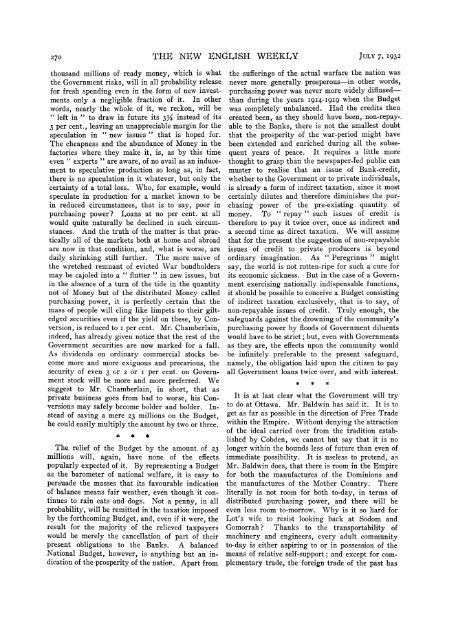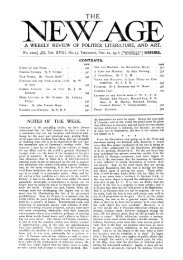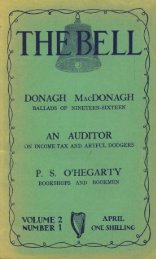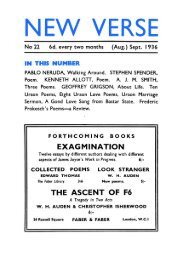Vol. I No. 12 - Modernist Magazines Project
Vol. I No. 12 - Modernist Magazines Project
Vol. I No. 12 - Modernist Magazines Project
You also want an ePaper? Increase the reach of your titles
YUMPU automatically turns print PDFs into web optimized ePapers that Google loves.
270 THE NEW ENGLISH WEEKLY Juur 7, 1932<br />
thousand millions of ready money, which is what<br />
the Government risks, will in all probability release<br />
for fresh spending even in the form of new investments<br />
only a negligible fraction of it. In other<br />
words, nearly the whole of it, we reckon, will be<br />
"left in-" to draw in future its 3^ instead of its<br />
5 per cent., leaving an unappreciable margin for the<br />
speculation in " new issues " that is hoped for.<br />
The cheapness and the abundance of Money in the<br />
factories where they make it, is, as by this time<br />
even " experts " are aware, of no avail as an inducement<br />
to speculative production so long as, in fact,<br />
there is no speculation in it whatever, but only the<br />
certainty of a total loss. Who, for example, would<br />
speculate in production for a market known to be<br />
in reduced circumstances, that is to say, poor in<br />
purchasing power? Loans at no per cent, at all<br />
would quite naturally be declined in such circumstances.<br />
And the truth of the matter is that practically<br />
all of the markets both at home and abroad<br />
are now in that condition, and, what is worse, are<br />
daily shrinking still further. The more naive of<br />
the wretched remnant of evicted War bondholders<br />
may be cajoled into a " flutter " in new issues, but<br />
in the absence of a turn of the tide in the quantity<br />
not of Money but of the distributed Money called<br />
purchasing power, it is perfectly certain that the<br />
mass of people will cling like limpets to their giltedged<br />
securities even if the yield on these, by Conversion,<br />
is reduced to i per cent. Mr. Chamberlain,<br />
indeed, has already given notice that the rest of the<br />
Government securities are now marked for a fall.<br />
As dividends on ordinary commercial stocks become<br />
more and more exiguous and precarious, the<br />
security of even 3 or 2 or i per cent, on Government<br />
stock will be more and more preferred. We<br />
suggest to Mr. Chamberlain, in short, that as<br />
private business goes from bad to worse, his Conversions<br />
may safely become bolder and bolder. Instead<br />
of saving a mere 23 millions on the Budget,<br />
he could easily multiply the amount by two or three.<br />
* * *<br />
The relief of the Budget by the amount of 23<br />
millions will, again, have none of the effects<br />
popularly expected of it. By representing a Budget<br />
as the barometer of national welfare, it is easy to<br />
persuade the masses that its favourable indication<br />
of balance means fair weather, even though it continues<br />
to rain cats and dogs. <strong>No</strong>t a penny, in all<br />
probability, will be remitted in the taxation imposed<br />
by the forthcoming Budget, and, even if it were, the<br />
result for the majority of the relieved taxpayers<br />
would be merely the cancellation of part of their<br />
present obligations to the Banks. A balanced<br />
National Budget, however, is anything but an indication<br />
of the prosperity of the natiotv Apart from<br />
the sufferings of the actual warfare the nation was<br />
never more generally prosperous—in other words,<br />
purchasing power was never moire widely diffused—<br />
than during the years 1914-1919 when the Budget<br />
was completely unbalanced. Had the credits then<br />
created beenr as they should have been,.non-repay-_<br />
able to the Banks, there is not the smallest doubt<br />
that the prosperity of the war-period might have<br />
been extended and enriched during all the subse<br />
quent years of peace. It requires a little more<br />
thought to grasp than the newspaper-led public can<br />
muster to realise that an issue of Bank-credit,<br />
whether to the Government or to private individuals,<br />
is already a form of indirect taxation, since it most<br />
certainly dilutes and therefore diminishes the purchasing<br />
power of the pre-existing quantity of<br />
money. To " repay " such issues of credit is<br />
therefore to pay it twice over, once as indirect and<br />
a second time as direct taxation. We will assume<br />
that for the present the suggestion of non-repayable<br />
issues of credit to private producers is beyond<br />
ordinary imagination. As " Peregrinus " might<br />
say, the world is not rotten-ripe for such a cure for<br />
its economic sickness. But in the case of a Government<br />
exercising nationally indispensable functions,<br />
it should be possible to conceive a Budget consisting<br />
of indirect taxation exclusively, that is to say, of<br />
non-repayable issues of credit. Truly enough, the<br />
safeguards against the drowning of the community's<br />
purchasing power by floods of Government diluents<br />
would have to be strict; but, even with Governments<br />
as they are, the effects upon the community would<br />
be infinitely preferable to the present safeguard,<br />
namely, the obligation laid upon the citizen to pay<br />
all Government loans twice over, and with interest.<br />
It is at last clear what the Government will try<br />
to do at Ottawa. Mr. Baldwin has said it. It is to<br />
get as far as possible in the direction of Free Trade<br />
within the Empire. Without denying the attraction<br />
of the ideal carried over from the tradition established<br />
by Cobden, we cannot but say that it is no<br />
longer within the bounds less of future than even of<br />
immediate possibility. It is useless to pretend, as<br />
Mr. Baldwin does, that there is room in the Empire<br />
for both the manufactures of the Dominions and<br />
the manufactures of the Mother Country. There<br />
literally is not room for both to-day, in terms of<br />
distributed purchasing power, and there will be<br />
even less room to-morrow. Why is it so hard for<br />
Lot's wife to resist looking back at Sodom and<br />
Gomorrah? Thanks to the transportability of<br />
machinery and engineers, every adult community<br />
to-day is either aspiring to or in possession of the<br />
means of relative self-support; and except for complementary<br />
trade, the foreign trade of the past has












